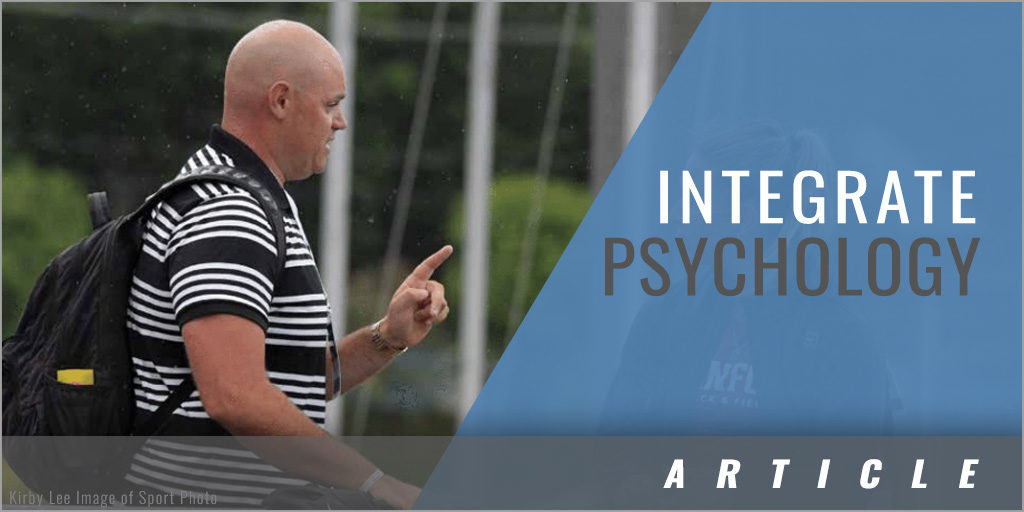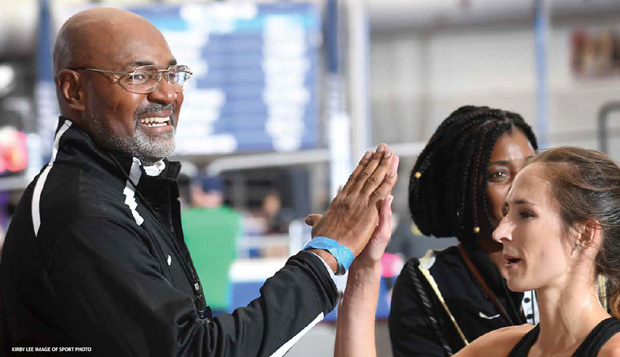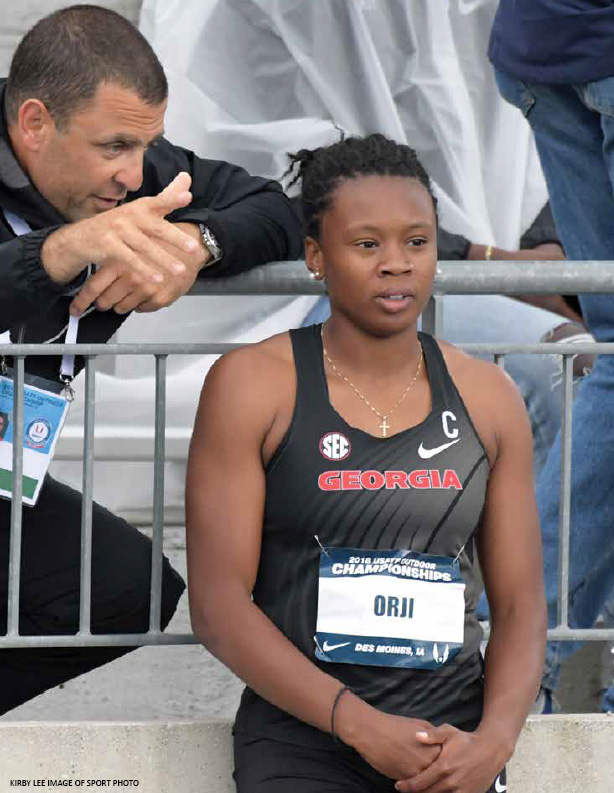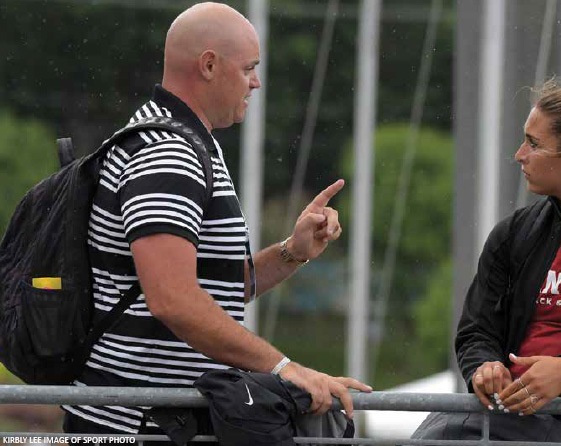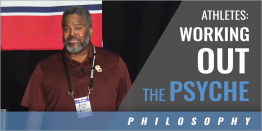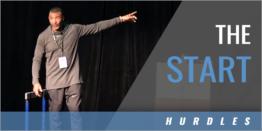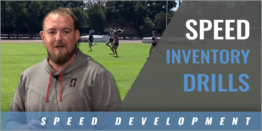|
By: Brian Zuleger, Ph.D. Originally Published in: Techniques Magazine Provided by: USTFCCCA
"I got a kid who..." this is a common phrase that coaches from all sports and all levels often ask sport psychology professionals. The question is typically about an BUILD IT MODEL VS. FIX IT MODEL Unfortunately many athletes and coaches have a negative stereotype about sport psychology. Traditionally sport psychology has been viewed as a "fix it" model. The athlete or coach comes seeking guidance only when there is a problem. Many see it as a last ditch effort to "fix" the athlete so the athlete can perform better. This is problematic because it creates a culture that views the use of sport psychology as a sign of "weakness" or "underperforming." The best athletes in the world in all sports have realized the importance of mental training in pursuing excellence in their sport. This highlights that everyone can benefit from mental training regardless of ability. When this becomes the mindset of the coaches and athletes then we can shift away from the "fix it" model towards a "build it" model. MENTAL STRENGTH COACH Mental strength coaches or certified mental performance consultants can provide expertise in mental training much like a certified strength and conditioning coach does in physical training. The mental strength coach is part of the support staff that serves the coaches and athletes in their efforts to pursue excellence in their sport. For this article, I will refer to the certified mental performance consultant as a mental strength coach. I refer to myself as a mental strength coach because this helps to more clearly define what I do and what I don't do, and it helps coaches and athletes make the connection between mental training and physical (strength) training in the weight room. As coaches, we do not send only our physically weak athletes to the weight room on a weekly basis. No, we send all our athletes including the national champions, and in many cases the national champions are the ones who buy into the strength and conditioning programs the most and see the greatest benefits. Mental training is the same way; every athlete should be doing it and the ones who are competing for the championship need it the most, as they are the ones who will be in the "high pressure," "make or break" or "championship" situations when they need their mind to be strong.
As my mentor, long time track and field coach, sport psychology professor and certified mental performance consultant Dr. Rick McGuire says, "Sport psychology should be delivered to and through the coach." What this means is that the mental strength coach is not a replacement for the coach, the mental strength coach supports the coach. When working with a mental strength coach, the services provided should align with your mission and vision as a coach and should address the individual needs of your program and the athletes within it. Often, mental strength coaches are viewed as someone who can come in and give a motivational speech or do some goal setting or teambuilding. While they are trained in those areas this is not what is most effective and recommended. The ideal scenario is one where the mental strength coach can be integrated into the team in the same way the strength and conditioning coach and athletic trainer are part of the team. While it may not be possible to have a mental strength coach on hand full-time or even part time, as the coach you can still utilize this person as much as possible even if that means you're the only one communicating with the mental strength coach. Many successful coaches in a variety of sports use mental strength coaches in this capacity where the coach consults with the mental strength coach for advice and then goes back and implements it. INTEGRATING MENTAL TRAINING INTO A PROGRAM Mental training is best delivered when it is fully integrated into all aspects of the program. In order for mental training to be most effective, it needs to become part of the culture of the program. Mental training should not just happen behind closed doors in an office one on Strength and conditioning is a great opportunity to work on mental training as the athletes are in a controlled environment and have multiple repetitions of a variety of exercises that challenge them in different capacities. For example, working on composure via breathing techniques prior to, during and after exercises is a great way to learn to control activation levels, which impact focus and helps the athlete learn the connection that exists between psychology and physiology. For more detail on how to implement mental training into strength and conditioning, see this article: www.nsca.com/Education/ Articles/Hot-Topic-IntegratingMental-Skills/
Athletic training is another avenue to integrate mental training into the program. Many coaches and athletic trainers often miss out on this opportunity as the focus
FINDING A MENTAL STRENGTH COACH Mental strength coaches can come from a variety of backgrounds (sport science, counseling psychology, psychology, and other random fields of expertise). Most sport psychology professionals in the United States are employed as professors at universities. In these roles, they focus on research and teaching and often have a personal consulting business. Depending on the size and emphasis of the university and the academic program they work in, the professors will focus more on research and less on teaching or vice versa. As a full-time professor, at a small teaching institution, I fall into this category More and more universities are moving towards hiring full-time sport psychology professionals in the athletic department. This is a good thing and is something that as coaches you should be advocating for with your athletic directors. Many of these people are being hired as sport psychologist (licensed psychologists) and spend the bulk of their time working in mental health cases with the athletes. This is extremely important as there is a large need for these services in collegiate athletics and at all levels of sport. Unfortunately they often have little time to address the applied sport psychology or mental training side. There is a need for multiple individuals with a variety of skills working in applied sport psychology within athletic departments, just like there are multiple strength and conditioning coaches and athletic trainers, etc. Another example is the mental strength coach who operates solely as a private business. This person is often harder to find because they are not connected to a university directory. Searching the Internet these days for such a professional will yield a myriad of results, unfortunately it is often very difficult to discern the quality of the professional or ability to fit your needs. Almost all of them will have claimed to have worked with Olympic and professional athletes, whether that is the case or not is often difficult to find out. One way to sort through this is to utilize the Association for Applied Sport Psychology's website (http://www.appliedsportpsych.org/ certification/find-a-consultant/). They provide links to the 500+ certified mental performance consultants in the world as well as more information regarding their certification. While I recommend coaches seek out a certified mental performance consultant, unfortunately, as with any certification the individuals that hold them can vary greatly in ability to deliver the services you may desire as the coach. I have colleagues and know of many professionals in sport psychology who do not hold this certification and they are very good at applying sport psychology in working with coaches and athletes. Ultimately, as the coach you need to find the person regardless of background whom you feel comfortable with and your athletes can connect with to see the most benefits from mental training. MENTAL HEALTH RESOURCES Mental health is one of the top priorities of the NCAA currently. While sport psychology professionals can also be mental health providers, this is not always the case. In my role, I am not trained to be a mental health provider, but I have a base-line of training that helps me to refer coaches and athletes to a qualified mental health provider when needed. Depending on the qualifications of the mental strength coach there may be the need to develop a referral system. At Adams State University, I utilize our campus counseling services as the first resource. I have developed a model for sport psychology service delivery that includes them as a resource for coaches and athletes. If there is a need that our campus mental health professionals cannot meet than I refer to outside sources. An example of this may be an athlete who has a severe eating disorder. In the event that this becomes an issue, there is a high-quality resource in Denver that is an eating disorder clinic specifically for athletes. There is also one in St. Louis, MO and other non-sport specific eating disorder clinics around the country. A good free resource for coaches on mental health is available from the NCAA at (http:/ / www.ncaa.org/health-and-safety/ sport-science-institute/mental-healthbest-practices-now-available). APPLYING SPORTS PSYCHOLOGY AS THE COACH A coach does not need to be an expert or have a Ph.D. in sport psychology to be able to apply sport psychology into their coaching. Many coaches already implement forms of mental training, many times without even realizing it. For example the scenario mentioned earlier of using film to breakdown technique or strategy is a common practice in sport. Most coaches and athletes use film from a purely strategy or technique emphasis and miss the opportunity to use it as a method of visualization. The coach is in the best position to apply sport psychology as the coach is environmental engineer for the culture of the program. The more the coach can apply sport psychology concepts into the coaching philosophy and the day to day environment of the athletes the more comfortable the athletes will become with the language, concepts and skills or mental training. EDUCATION IN APPLIED SPORT PSYCHOLOGY A common trait among successful coaches is that they are always learning, always looking for ways Formal education. Obtaining continuing education in the physical and technical aspects of our sport is often much easier than finding any education (much less quality education) regarding the mental aspects of training and competing. Most coaching clinics ignore this aspect or loosely touch on it, but rarely in a way that a coach can take away knowledge and apply it. One good option for obtaining formal education on sport psychology is through the USTFCCCA Academy course in sport psychology. For more information about academy offerings see this link (http://www. ustfccca.org/track-and-field-acade-my). Another good avenue to obtain further education in sport psychology is through university course work. Coaches can take individual courses or pursue a complete degree in applied sport psychology. I created two master's degree programs in Applied Sport Psychology (on campus and online) to accommodate educating sport psychology practitioners and coaches. For more information about degree programs and courses in applied sport psychology at Adams State University see this link (http://adams.edu/academics/hppe/graduate/index.php). Informal education. As stated above, highly successful coaches are always seeking out ways to improve at their craft. One of the ways to do that is through self-study via reading books, research, articles, listening to speakers, podcasts, etc. Another method is through conversations with fellow coaches and experts in sport science and other fields. There are endless books both in and out of sport psychology that are beneficial to read. The best resources I have encountered for sport psychology are "The Psychology of High Performance Track and Field" edited by Ralph Vernacchia and Traci Statler, and "Coaching Mental Excellence" by Vernachia, McGuire, and Cook, and "Inner Strength" by Ralph Vernacchia. While these are great resources, they may be difficult to find online to purchase, but if you can find them, that is where I would start reading. Some others that are easily accessible are "Relax and Win" by Bud Winter and Jimson Lee, "In Pursuit of Excellence" by Terry Orlick, "Life is Yours to Win" by Augie Garrido, "Mastery" by George Leonard, "From the Whistle to the Snap" by Rick McGuire and "Heads Up Baseball 2.0" by Ken Ravizza and Tom Hanson. A great podcast resource is "Finding Mastery" and "Minutes on Mastery" by Michael Gervais. There are many others I would be happy to share via email. In conclusion, sport psychology is an under-utilized and often misunderstood area of sport performance that can greatly help coaches and athletes perform better. I strongly encourage you to seek out more education in this area. There are many trained professionals in sport psychology and many times they may be closer than you realize. For those coaches in the collegiate ranks you may not have to look further than your own university/ college. For those working at other levels, you may have a local university or private business professional close by. For coaches at the high school and youth level, the sooner you can start introducing your athletes to the benefits of mental training the better. Many times athletes are exposed to mental training later in their careers and every single one of them I have encountered says "I wish I knew this when I was younger." With formal and informal education resources and online degree programs there is always the option to gain more education from anywhere in the world as well as your local resources. The more coaches we can have educated in sport psychology the more mainstream mental training will become, which will only improve performance for the athletes we coach in sport and in life. REFERENCES Bloom, G. A., & Salmela, J. H. (2000). Personal characteristics of expert team sport coaches. Journal of Sport Pedagogy, 6, 56-76. Garrido, A. (2011). Life is yours to win: Lessons forged from the purpose, passion, and magic of baseball. New York: Simon & Schuster. Leonard, G. (1991). Mastery: The keys to success and long-term fulfillment. New York: Plume. Orlick, T. (2016). In pursuit of excellence: How to win in sport and life through mental training. Champaign, IL: Human Kinetics. Ravizza, K & Hanson, T. (2016). Heads up baseball 2.0: 5 Skills for competing one pitch at a time." Tampa, FL: Hanson House Vernacchia, R. A., McGuire, R. T., & Cook, D. L. (1996). Coaching mental excellence: "It does matter whether you win or lose..." Portola Valley, CA: Warde. Vernacchia, R. A. & Statler, T. A. (2005). The psychology of high-performance track and field. Mountain View, CA: Tafnews Press. Vernacchia, R. (2003). Inner strength: The mental dynamics of peak performance. Palo Alto, CA: Warde Publishers. Winter, B., & Lee, J. Zuleger, B. M. (2011). Leadership characteristics of successful NCAA Division I track and field head coaches (Master's thesis). Retrieved from WWU Master's Thesis Collection. (Paper 129). Zuleger, B. M. (2012). Hot topic: Integrating mental skills training into a strength and conditioning program. https:11www.nsca.coml EducationlArticles1Hot-TopicIntegrating-Mental-Skills Zuleger, B., Vernacchia, R. (2012). A coach's leadership. Techniques. Vol. 5, Number 2, pg. 42-50 Brian Zuleger is an assistant professor in sport psychology in the Human Performance and Physical Education Department at Adams State University, graduate program coordinator for Applied Sport Psychology, mental strength coach and assistant coach for the Adams State University cross country and track and field program and director of the Joe I. Vigil Center for Human Performance and Coach Education. He holds certifications as CMPC-AASP, USOC-Sport Psychology and Mental Training Registry, CSCSNCSA, C-EP-ACSM. E-mail: bri-anzuleger@adams.edu |
